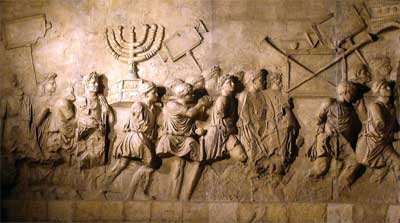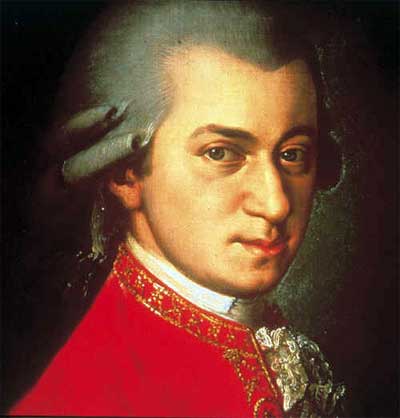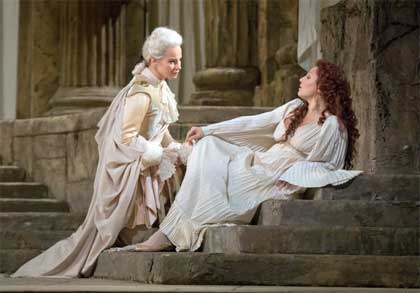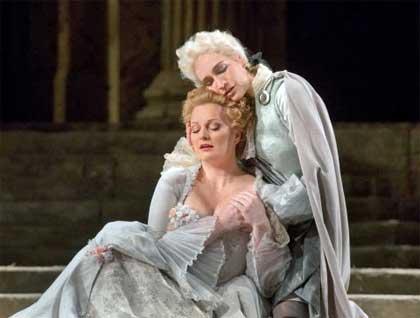Opera (1791)
by Wolfgang Amadeus Mozart
Libretto by Caterino Mazzolà
The Metropolitan Opera, New York
Live In HD
Conductor: Harry Bicket
Production: Jean-Pierre Ponnelle
With Lucy Crowe (Servilia), Barbara Frittoli (Vitellia), Elīna Garanča (Sesto), Kate Lindsey (Annio), Giuseppe Filianoti (Tito), Oren Gradus (Publio)

Roman Emperor Tito (Giuseppe Filianoti) is in love with Berenice, daughter of the king of Judea who he gives up because he is criticized for going outside of Rome for a wife. He then focuses on Servilia (Lucy Crowe), but that turns out to be no good because she is in love with Annio (Kate Lindsey).
Meanwhile, Vitellia (Barbara Frittoli), the former emperor’s daughter, having been upset by Tito’s original interest in Berenice, decides it would be a good idea to kill him. So, she enlists Sesto (Elīna Garanča), who is in love with her, to do the dastardly deed. Blinded by love, Sesto, though Tito’s friend and essentially a noble character, prepares to carry out Vitellia’s wishes.
Meanwhile, Tito decides that maybe he will marry Vitellia after all. But she gets wind of this too late; Sesto has already wreaked havoc. However, despite Sesto’s attempt, Tito has survived and Sesto is found out.
Nevertheless, Sesto, noble and in love, does not betray Vitellia; he faces death. But, finally, Vitellia comes clean to the emperor, exonerating Sesto. Since the emperor, at least in this version, is such a nice guy, he pardons Sesto and everyone else.

by the Romans Under the Command of Titus, A.D. 70 (1850)
by David Roberts
Oil on canvas
Who knew Emperor Titus was such a nice guy?
Some number of those over whom he ruled, and whom he conquered mercilessly, probably did not think so. Those would well include the Jews in the Holy Land, where, before he was emperor, Titus was responsible for the destruction of the Temple in Jerusalem. One can go to Rome and see, on the Arch of Titus, the frieze celebrating that particular massacre.
Roman Christians of the time, no doubt, would not have been thrilled with Titus’ major contribution to the theater scene of the time, the Colosseum, where, as a vehicle for public entertainment, many of them met untimely ends.

But, in the fantasy world of La Clemenza di Tito, Titus is all heart, generous and forgiving.
Clearly, Mozart, a lifelong Freemason and exponent of Enlightenment thinking, might have taken greater exception to this oddly skewed portrait, but he took on the commission for this opera in the last year of his life during a time of impoverishment and illness; he was offered double wages for it.

celebrating the sacking of the Temple in Jerusalem
The libretto is not one of the greats, like those created by Lorenzo da Ponte, for Mozart, including The Marriage of Figaro (1786), Don Giovanni (1787) and Cosi Fan Tutte (1790). But, though not anywhere near those libretti, La Clemenza di Tito does have some curiously interacting dramas and has enough complexity to keep one’s interest.
It is certainly not boring to listen to. Despite the warped biographical portrait and the weak libretto, Mozart created some beautiful music.

One of the curiosities of this opera is that, as in some Baroque opera, several of the leading men’s roles are played by women. The emperor is sung by a male tenor, and his advisor, Publio, is sung by a male bass, but, otherwise, except for the chorus, it is women all around.
And in this performance, those women have done a wonderful job.

Barbara Frittoli as Vitellia
in “La Clemenza di Tito”
Photo: Ken Howard
Courtesy Metropolitan Opera, New York
In the leading role, as Sesto, Elīna Garanča is persuasive and delightful. Her voice is rich and supple and she does a convincing job in the role. I was particularly taken with Garanča during the intermission interview she had with Susan Graham, the host of the Live in HD broadcast; she was so energetic and lively she could barely contain herself.
As Vitellia, Barbara Frittoli did a fine job, though the role is pretty bizarre, requiring the actress to go from histrionically and deviously murderous to honest and penitent in unvbelievably short order. Vocally, she did a commendable job, particularly in the final act aria in which she lays bare her soul to Tito and to everyone else.

Kate Lindsey as Annio
in “La Clemenza di Tito”
Photo: Ken Howard
Courtesy Metropolitan Opera, New York
However, the real revelation of this performance was Kate Lindsey as Annio.
What an amazingly rich and glowing voice! And she can act too. She apparently is a product of the Met’s young artist’s program and has performed recently in quite a few Met productions, including Siebel in Faust, Cherubino in The Marriage of Figaro and Hänsel in Hänsel and Gretel.
In an interview with Lindsey, Susan Graham pointed out that, in addition to this performance as a man in La Clemenza di Tito , Lindsey had done all of those other roles as men. She has a youthful litheness that sets her up well for those, but her voice is so spectacular I would expect she will develop as one of the Met’s great and versatile female stars.

Photo: James Salzano
Harry Bicket did a wonderful job conducting, giving energy and precision throughout. He has a graceful and compelling sense of authority. I really enjoyed his conducting, as well, in last year’s Rodelinda by Handel, another delightful Live in HD offering from the Metropolitan Opera.
– BADMan
Leave a Reply